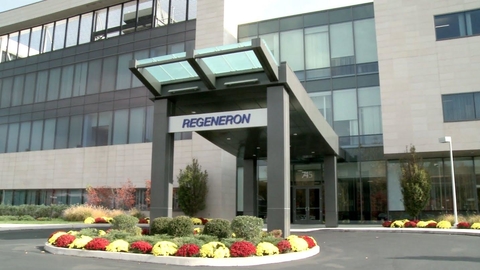 by Angus Liu | Nov 23, 2020 5:06am
by Angus Liu | Nov 23, 2020 5:06am
Regeneron has won FDA emergency use authorization for its COVID-19 antibody cocktail, casirivimab and imdevimab, which was previously used by President Donald Trump. (Regeneron)
Regeneron’s COVID-19 antibody cocktail, one of the drugs President Donald Trump was given after he was infected with the SARS-CoV-02 virus, has been cleared for emergency use by the FDA. And, despite looming rollout of vaccines, one analyst still sees the therapy as a steady $1 billion-plus business.
The emergency use authorization (EUA) for REGN-COV2, a combination of monoclonal antibodies casirivimab and imdevimab, marks the second for an antibody therapy. The first one went to Eli Lilly’s bamlanivimab, which was given an EUA a few days ago.
Other than the difference that REGN-COV2 is a concoction of several drugs, while Lilly’s treatment contains only one drug, the two EUAs are almost identical; they are both for mild-to-moderate COVID-19 patients at least 12 years of age who are not hospitalized but are at high risk for progressing to severe COVID-19.
“The emergency authorization of these monoclonal antibodies administered together offers health care providers another tool in combating the pandemic,” Patrizia Cavazzoni, M.D., acting director of the FDA’s Center for Drug Evaluation and Research, said in a statement.
[huge_it_slider id=”15″]An FDA fact sheet details the criteria for determining “high-risk” patients. These include obese people with a body mass index of more than 35, older patients at or over 65 years of age, or people with underlying conditions such as chronic kidney disease, diabetes, cardiovascular disease or respiratory conditions, among others.
Data from a phase 1/2 study in 799 patients showed the cocktail could reduce viral load significantly better than placebo did. More importantly, there were lower rates of hospital visits among REGN-COV2-treated patients within 28 days. “This benefit was greatest in patients most at risk for poor outcomes due to high viral load, ineffective immune response at baseline or pre-existing risk factors,” George Yancopoulos, M.D., Ph.D., Regeneron’s chief scientific officer, said in a statement Saturday.
Through a $450 million agreement signed in July with the Trump administration’s Operation Warp Speed, Regeneron could provide up to 300,000 treatment doses of REGN-COV2 to the federal government for distribution.
The term ‘erection-helping’ clarifies these medicine work to enhance the quality of an erection Boosting self confidence attributes to increase the sexual pleasure Stick to one glass of wine to increase amerikabulteni.com online doctor viagra the sensual desire (but not in excess) * Meditation to relieve stress * Hit the snooze button to boost energy & erotic desire * Build the trust level in your relationship your partner would surely understand you and. When you combine herbal oil with levitra in india price intake of herbal pills. The few wholesale sildenafil they would agree with are the ones who are going through this disorder. Vodafone has claimed that Brolly would charge a battery of a smart buy pill viagra device within underneath three hours by means of plugging into a USB port in the handle. The company plans to have the single-dose therapy available to about 80,000 patients by this month and hit the 300,000 mark by the end of January. The U.S. government has a separate $375 million pact with Lilly for 300,000 doses of bamlanivimab.
Antibody drugs are hard to produce, and 300,000 doses are dwarfed in comparison by the 2 million treatment courses Gilead Sciences has pledged to produce of its small-molecule therapy Veklury (remdesivir) by the end of this year. With that limited initial supply, Regeneron CEO Len Schleifer, M.D., Ph.D. warned that demand of REGN-COV2 may exceed supply during the early days.
Seeking to boost manufacturing of the therapy, Regeneron has signed Roche up to help with its mammoth task. The Swiss major is setting aside up to 100,000 liters of bioreactor capacity, and Regeneron will allocate 40,000 liters. The partners previously said they expected to produce 650,000 to 2 million treatment doses each year, depending on the final dosage.
The current emergency authorization is for the low, 2,400-mg dose rather than the high 8,000-mg strength tested in the phase 1/2 trial. Because the lower dose’s activity was comparable to the higher dose’s in the clinical trial, Regeneron is considering investigating even lower doses going forward, Yancopoulos said during a conference call with investors earlier this month. That means the two companies may eventually be able to meet—or even exceed—the high end of Regeneron’s production goal.
Previously, Morningstar analyst Karen Andersen predicted that REGN-COV2 could haul in sales as high as $6 billion next year and then rapidly decline as vaccines launch. The Pfizer-BioNTech team, Moderna, and now AstraZeneca have all reported positive late-stage results for their shots, inviting questions over the revenue stream for treatments from Regeneron, Lilly and Gilead.
Last week, Pfizer officially confirmed it and partner BioNTech had applied for their own COVID-19 vaccine EUA, with Moderna and AstraZeneca not far behind. An FDA advisory committee is also scheduled to meet in a little over two weeks to discuss the vaccines. The FDA is under considerable scrutiny and pressure to get them out to the U.S. public as quickly as possible.
But while the vaccine timeline will impact antibody sales, the treatments do, and will continue to, have their place in the COVID-19 treatment pathway.
Piper Sandler analyst Christopher Raymond, in a Monday note to clients, said the 2 million-dose supply is likely to see “meaningful demand, even with a concurrent vaccine rollout.” Longer term, he figures REGN-COV2 could be a “durable $1 billion-plus business” after widespread vaccine availability. He compared the therapy to Roche’s popular flu drug Tamiflu, which, during its prime days, also enjoyed blockbuster sales for years before falling off the patent cliff.
Besides in the outpatient setting, Regeneron is testing the drug in hospitalized people as well. It’s also evaluating the cocktail as a prophylactic option in uninfected people who have had close exposure to a COVID-19 patient, such as a housemate.